August 11, 2025 by 100XBuilds Team
Cash Flow Management: Large Custom Project Strategies

When Toll Brothers reported a 23% improvement in cash conversion cycle after implementing advanced cash flow management systems, it wasn't luck—it was strategic financial engineering. For luxury builders managing $5M+ projects, cash flow isn't just about staying solvent; it's about maximizing working capital efficiency to fuel aggressive growth.
The brutal reality? 73% of construction companies fail due to cash flow problems, not lack of profitability. When you're juggling multiple $8-15M custom homes with 18-month build cycles, traditional cash management approaches will strangle your growth potential.
The Million-Dollar Cash Flow Challenge
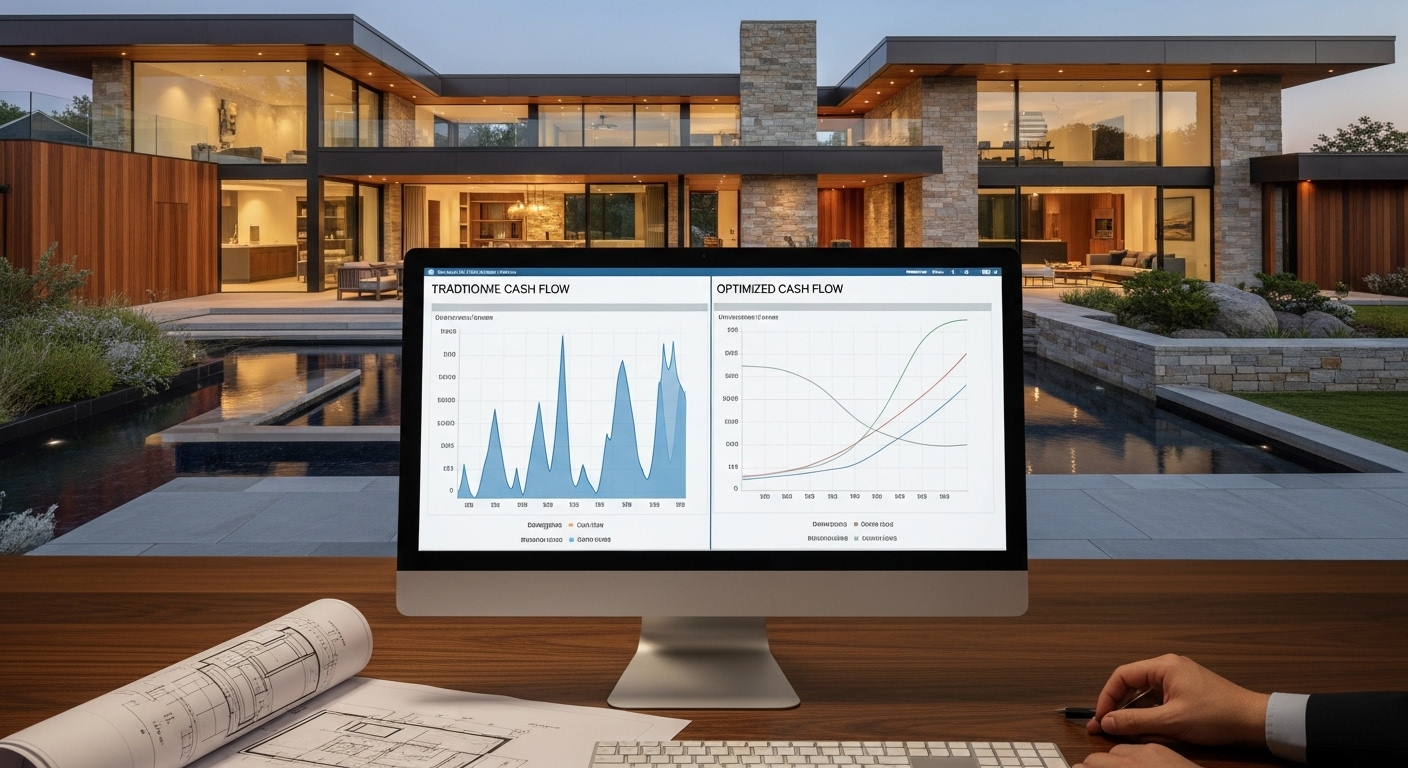
Managing cash flow for large custom projects differs fundamentally from production building. You're not dealing with predictable 90-day cycles—you're orchestrating complex financial symphonies where a single missed payment can cascade into project delays costing $50,000+ per month.
The numbers tell the story:
- Average luxury custom home: $12M project value
- Typical payment schedule: 8-12 milestone payments
- Cash gap periods: 45-90 days between major draws
- Working capital requirements: 15-25% of project value
Peak cash exposure often hits 60-90 days before substantial completion, precisely when change orders and premium finishes create the highest material costs.
Strategic Payment Structure Engineering
The foundation of cash flow optimization starts with intelligent contract structuring. Traditional 10% down payments are financial suicide for luxury builders.
The 30-20-50 Framework
Initial mobilization: 30% upon contract execution
This covers land acquisition, permits, and initial material orders. Non-negotiable for projects exceeding $10M.
Progressive draws: 20% at five key milestones
- Foundation completion
- Framing and mechanical rough-in
- Drywall and interior rough completion
- Finish work 75% complete
- Final completion and walk-through
Retention holdback: Maximum 5% for 30 days post-completion
Industry standard 10% retention creates unnecessary cash strain. Negotiate aggressively on this point.
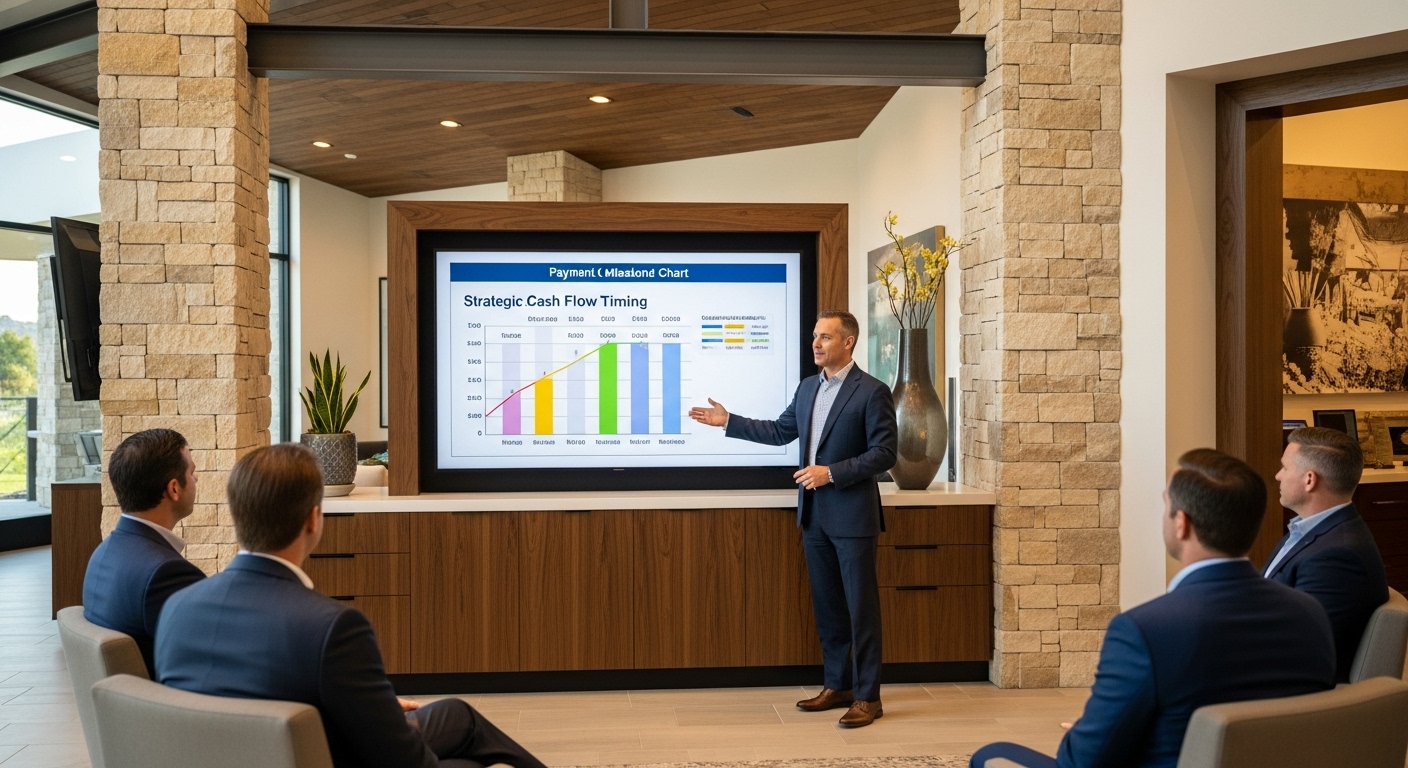
Advanced Payment Acceleration Techniques
Material allowance pre-funding: Require clients to establish separate accounts for major material purchases (stone, millwork, fixtures) with 120-day forward funding.
Change order immediate payment: All change orders require 100% payment within 72 hours of approval. No exceptions.
Seasonal adjustment clauses: Build in 15-20% payment acceleration for projects spanning winter months when productivity drops.
Working Capital Optimization Strategies
The Revolving Credit Advantage
Establish a revolving credit facility equal to 40% of your annual revenue. This isn't emergency funding—it's strategic working capital that enables you to:
- Purchase materials at volume discounts (typically 8-12% savings)
- Maintain consistent subcontractor relationships during cash gaps
- Capitalize on opportunistic land acquisitions
Real example: A $25M annual revenue builder maintains a $10M revolving facility, using an average of $3.2M monthly. The carrying cost ($15,000/month) generates $180,000 annually through material discounts alone.
Subcontractor Payment Optimization

Net 45 payment terms with 2% early payment discounts
This creates a natural cash flow buffer while incentivizing subcontractor efficiency. Most subs will take the discount, effectively reducing your costs by 2% while extending payment cycles.
Milestone-based subcontractor payments aligned with owner draws
Never pay subcontractors before receiving corresponding owner payments. Structure all subcontractor agreements with payment milestones that mirror your owner draw schedule plus 10 days.
Retention matching: Hold the same retention percentage from subcontractors that owners hold from you.
Technology-Driven Cash Flow Forecasting
13-Week Rolling Cash Flow Models
Implement weekly cash flow forecasting with 13-week forward visibility. This isn't accounting—it's financial intelligence that enables proactive decision-making.
Key metrics to track:
- Cash conversion cycle by project
- Days sales outstanding (target: <30 days)
- Average payment period (optimize to 45 days)
- Working capital turnover ratio (target: >4x annually)
Automated Payment Processing Systems
ACH payment requirements: Eliminate check processing delays by requiring all payments via ACH transfer. This accelerates cash receipt by 3-5 days per payment.
Automated invoice generation: Deploy systems that automatically generate progress invoices based on field completion reports. Manual invoicing delays cost an average of 8 days per billing cycle.
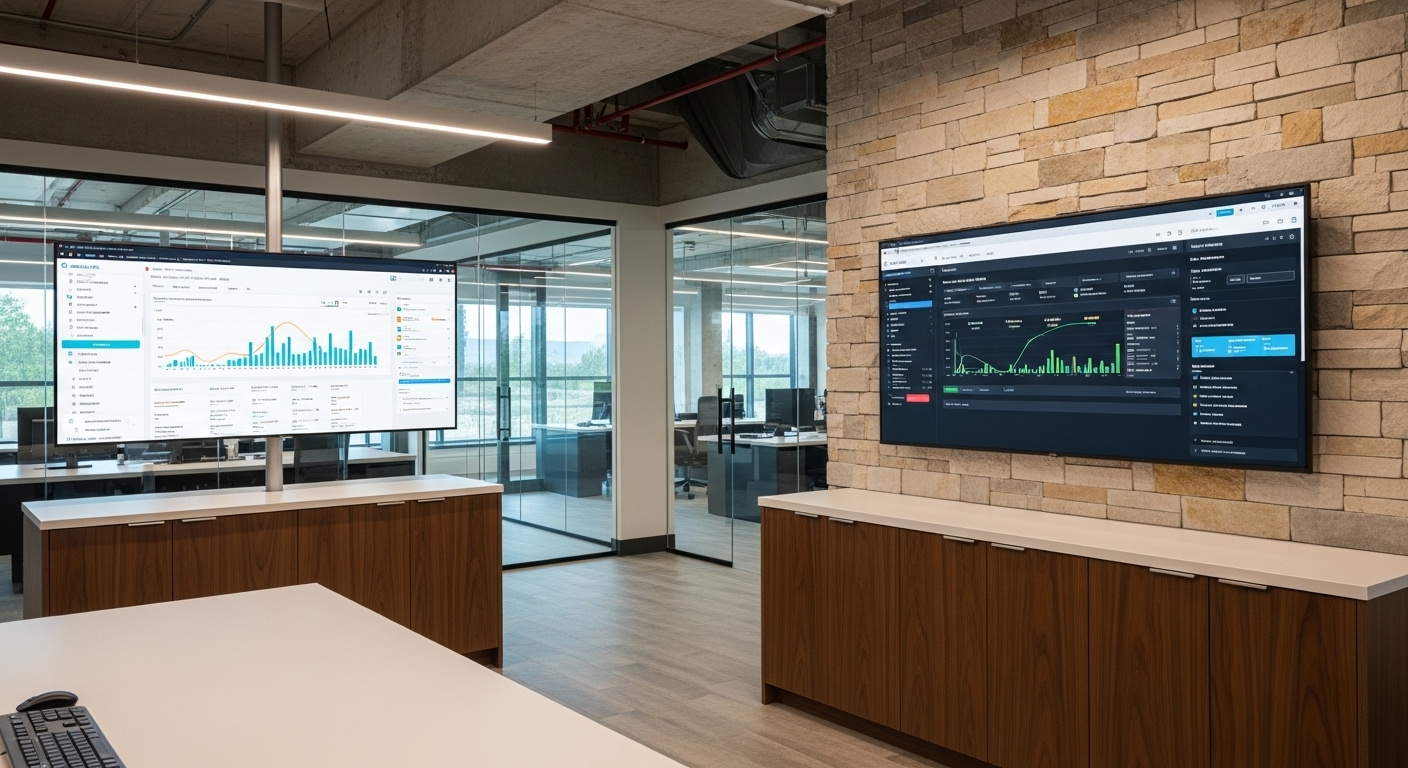
Risk Mitigation Through Financial Diversification
Project Portfolio Balance
The 40-30-20-10 rule:
- 40% of capacity: Projects in active construction
- 30% of capacity: Projects in pre-construction/permitting
- 20% of capacity: Signed contracts awaiting start
- 10% of capacity: Reserve for change orders and delays
This distribution ensures consistent cash generation while maintaining growth capacity.
Geographic Cash Flow Hedging
For builders operating in multiple markets, geographic diversification provides natural cash flow hedging. Different markets have varying seasonal patterns, permit processing times, and economic cycles.
Example portfolio distribution:
- Primary market: 60% of projects
- Secondary market: 25% of projects
- Tertiary market: 15% of projects
Advanced Financing Strategies
Construction-to-Permanent Loan Optimization
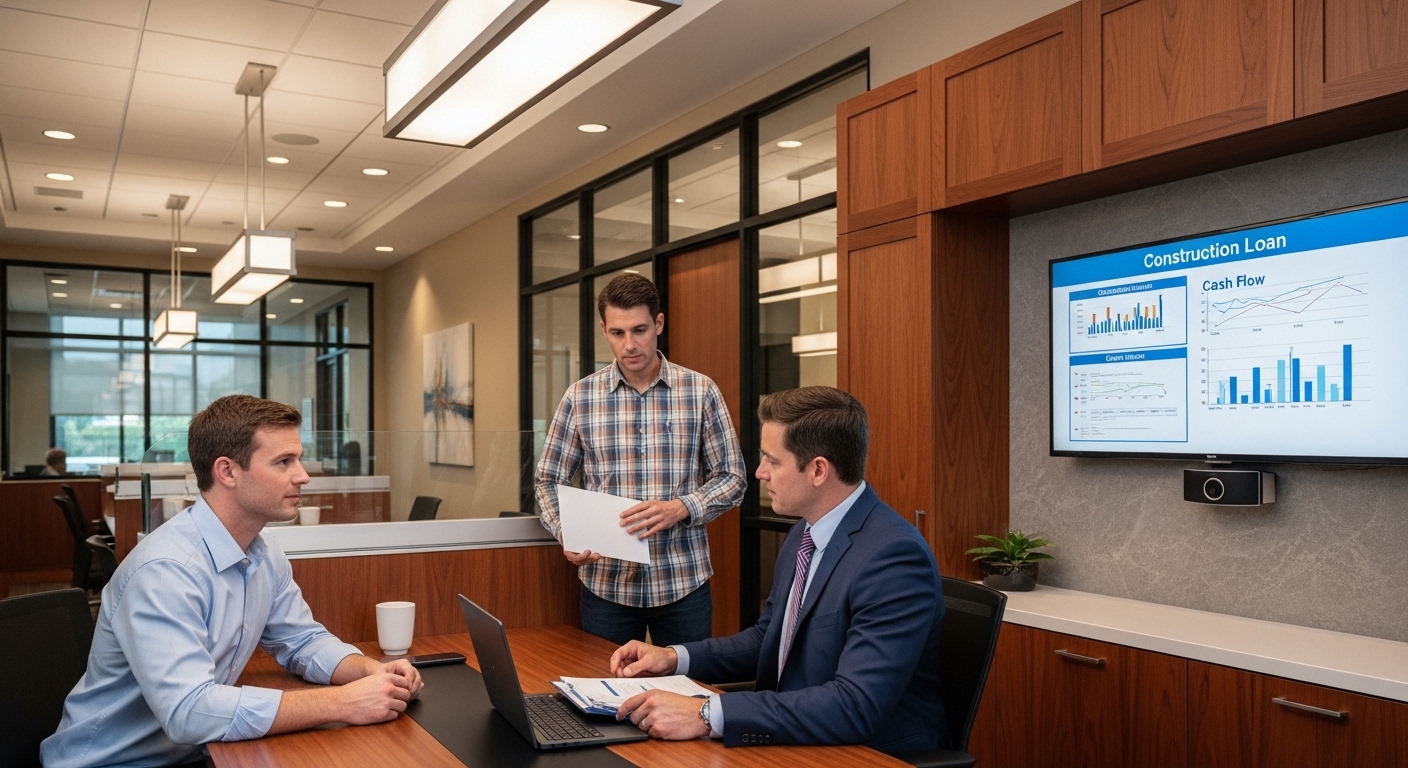
Interest-only construction periods: Negotiate interest-only payments during construction to minimize cash outflow. The difference between principal+interest and interest-only payments can exceed $25,000 monthly on a $5M project.
Multiple draw schedules: Establish draw schedules that exceed standard monthly intervals. Weekly or bi-weekly draws dramatically improve cash flow timing.
Rate lock strategies: For projects exceeding 18 months, negotiate rate locks or caps to protect against interest rate volatility.
Alternative Financing Mechanisms
Equipment financing for major tools/machinery: Separate financing for equipment purchases preserves working capital for operations.
Factoring for large receivables: For projects with extended payment cycles, factoring can provide immediate cash at 2-4% discount rates.
Joint venture partnerships: Strategic partnerships with other builders or investors can provide capital infusion for larger projects while sharing risk.
Seasonal Cash Flow Management
Winter Cash Flow Strategies
Accelerated interior work scheduling: Front-load interior trades during winter months to maintain cash generation when exterior work slows.
Material pre-purchasing: Use fall cash surpluses to pre-purchase spring materials, capturing early-order discounts while smoothing cash outflows.
Subcontractor retainer programs: Establish winter retainer programs with key subcontractors to ensure spring availability while creating predictable cash outflows.
Performance Monitoring and Optimization
Key Performance Indicators
Cash conversion cycle: Target <120 days for luxury custom projects
Working capital efficiency: Revenue per dollar of working capital should exceed 6:1
Payment collection rate: >95% of invoices collected within terms
Change order cash impact: Track change order payment timing separately from base contract payments
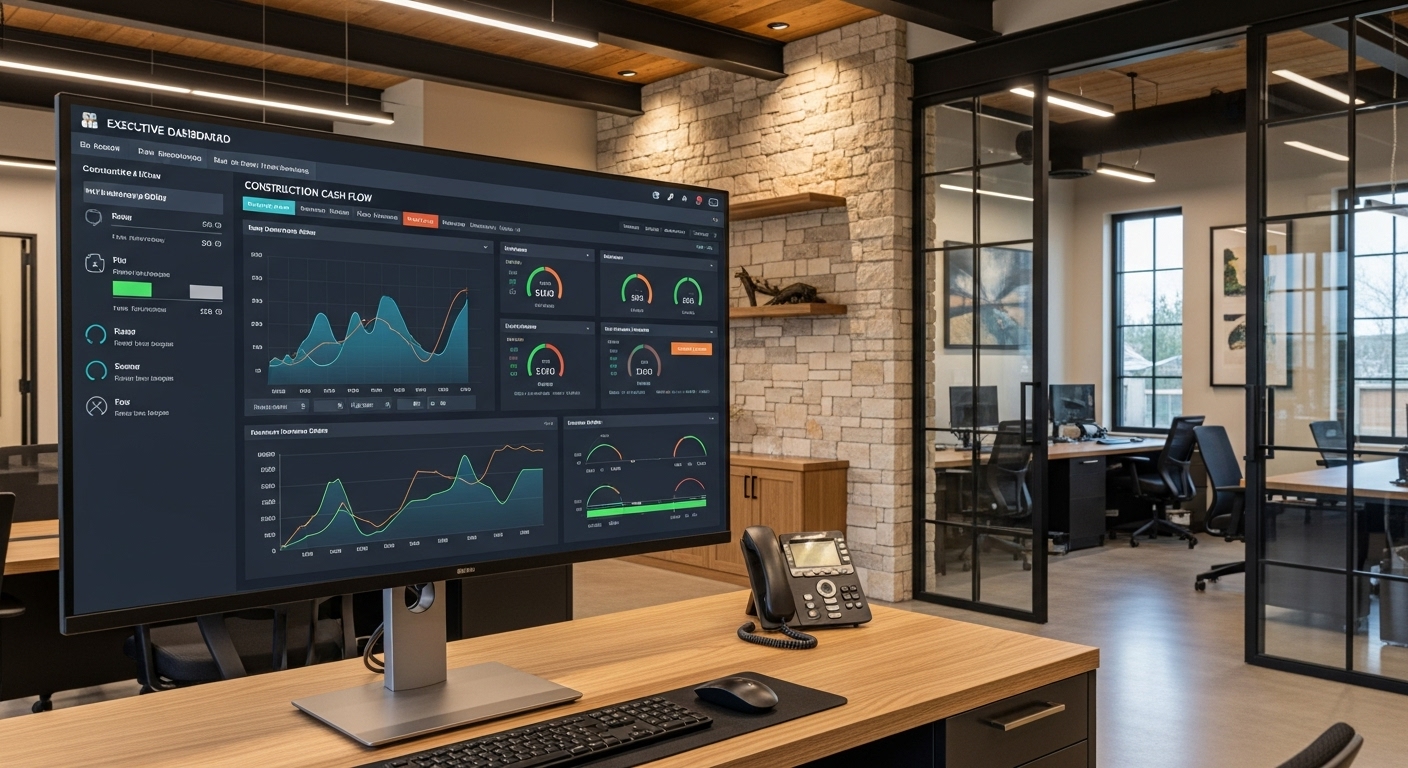
Monthly Cash Flow Reviews
Conduct formal monthly cash flow reviews examining:
- Actual vs. projected cash flows by project
- Payment timing variance analysis
- Subcontractor payment optimization opportunities
- Working capital utilization efficiency
Crisis Cash Flow Management
Early Warning Systems
Implement automated alerts for:
- Project payments >15 days overdue
- Subcontractor payment requests exceeding budgeted amounts by >10%
- Bank covenant ratios approaching limits
- Working capital utilization exceeding 80% of available credit
Emergency Cash Flow Protocols
Immediate actions when cash flow tightens:
- Accelerate all outstanding invoicing
- Implement daily cash position monitoring
- Defer all non-critical expenditures
- Activate emergency credit facilities
- Negotiate extended payment terms with suppliers
The Competitive Advantage of Superior Cash Management
Builders who master cash flow management gain decisive competitive advantages:
Negotiating power with suppliers: Cash-strong builders secure better pricing and priority delivery
Subcontractor relationships: Reliable payment builds loyalty and ensures quality trade availability
Growth capacity: Optimized cash flow enables aggressive market expansion without dilutive equity raises
Market positioning: Financial strength allows premium pricing and selective client acceptance

The difference between builders who scale successfully and those who struggle isn't construction expertise—it's financial sophistication. When you optimize cash flow management, you transform from a contractor managing projects to a financial strategist building wealth.
Ready to optimize your cash flow management? Our financial management specialists have helped luxury builders improve cash conversion cycles by an average of 35% while reducing working capital requirements by $2-4M. The consultation that could transform your financial operations is one conversation away.
Schedule your cash flow optimization assessment today. We'll analyze your current payment structures, identify immediate improvement opportunities, and design a customized cash management system that fuels sustainable growth while protecting your financial position.
